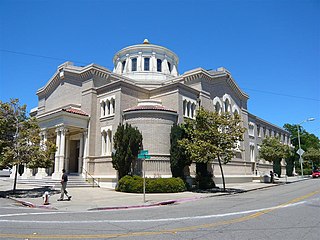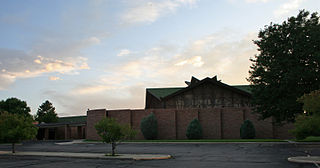
Rodef Shalom Congregation is an historic Reform Jewish congregation and synagogue located at 4905 Fifth Avenue, Pittsburgh, Pennsylvania, in the United States. The landmark building was designed by architect Henry Hornbostel and completed in the Beaux-Arts style.
The history of the Jews in Omaha, Nebraska, goes back to the mid-1850s.

Temple Beth El is a Reform synagogue located at in Bloomfield Township, Oakland County, Michigan, in the United States. Beth El was founded in 1850 in the city of Detroit, and is the oldest Jewish congregation in Michigan. Temple Beth El was a founding member of the Union for Reform Judaism in 1873, and hosted the meeting in 1889 during which the Central Conference of American Rabbis was established.

Breed Street Shul, also known as Congregation Talmud Torah of Los Angeles or Breed Street Synagogue, is a former Orthodox Jewish synagogue in the Boyle Heights section of Los Angeles, California, in the United States. It was the largest Orthodox synagogue west of Chicago from 1915 to 1951, and is listed in the National Register of Historic Places.

Temple Beth-El, officially known as the Congregation Sons of Israel and David, Temple Beth-El, is a Reform Jewish synagogue located at 70 Orchard Avenue, in Providence, Rhode Island, in the United States.

Temple Sinai is a Reform Jewish congregation and synagogue located at 2808 Summit Street in Oakland, California, in the United States. Founded in 1875, it is the oldest Jewish congregation in the East San Francisco Bay region.

Congregation Beth Israel is a Reform Jewish congregation and synagogue, located at 10460 North 56th Street in Scottsdale, Arizona, in the United States. Incorporated in 1920, the congregation affiliated with the Union for Reform Judaism in 1935.

Congregation Beth Ahabah is a Reform Jewish synagogue at 1121 West Franklin Street, Richmond, Virginia, in the United States. Founded in 1789 by Spanish and Portuguese Jews as Kahal Kadosh Beth Shalome, it is one of the oldest synagogues in the United States.

Shaarai Torah Synagogue is an historic former Modern Orthodox Jewish synagogue building located at 32 Providence Street, Worcester, Massachusetts, in the United States. Worcester's first Modern Orthodox "shul", Shaarai Torah was considered the city's "Mother Synagogue" for many years.

The Temple Emanuel, also known as Congregation Emanuel, is a Reform Jewish congregation and synagogue, located at 51 Grape Street, in Denver, Colorado, in the United States.

Temple Israel of the City of New York is a Reform Jewish congregation and synagogue located at 112 East 75th Street, on the Upper East Side of Manhattan in New York City, New York, United States. The congregation was incorporated by German Jews in 1873.

B'nai Jacob Synagogue is a former Conservative synagogue in Ottumwa, Iowa. The originally Orthodox congregation was established in 1898, and it constructed the E. Main Street synagogue building in 1915, and joined the Conservative movement in the 1950s.
Jews have been living in Maine, a state in the northeastern United States, for 200 years, with significant Jewish communities in Bangor as early as the 1840s and in Portland since the 1880s. The arrival of Susman Abrams in 1785 was followed by a history of immigration and settlement that parallels the history of Jewish immigration to the United States.

Beit Shalom Jewish Community is a Reform Jewish shared synagogue located at 2215 East Kimberly Road, on the east side of Davenport, Iowa, in the United States. The shared community facility was established in 2019 and is home to two congregations, Temple Emanuel, established in 1861, and Congregation Beth Israel, established in 1936. Temple Emanuel is the oldest Jewish congregation in Iowa and both congregation are affiliated with the Union for Reform Judaism.

The Jewish community of Houston, Texas has grown and thrived since the 1800s. As of 2008, Jews lived in many Houston neighborhoods and Meyerland is the center of the Jewish community in the area.

Sinai Synagogue is a Reform Jewish congregation and synagogue, located on Roman Avenue in Roundhay, Leeds, West Yorkshire, England, in the United Kingdom. The congregation was founded in 1944 and is affiliated to the Movement for Reform Judaism.

The Jewish community of the Greater Cleveland area comprises a significant ethnoreligious population of the U.S. State of Ohio. It began in 1839 by immigrants from Bavaria and its size has significantly grown in the decades since then. In the early 21st century, Ohio's census data reported over 150,000 Jews, with the Cleveland area being home to more than 50% of this population. As of 2018, Greater Cleveland is the 23rd largest Jewish community in the United States. As of 2023, the Cleveland Jewish Community is estimated to be about 100,000 people.

The Congregation Montefiore Synagogue is an historic former synagogue, now church, located at 355 South 300 East, in downtown Salt Lake City, Utah, in the United States.
The city of Cumberland, Maryland is home to a small and declining but historically significant Jewish community. The city is home to a single synagogue, B'er Chayim Temple, one of the oldest synagogues in the United States. Cumberland has had a Jewish presence since the early 1800s. The community was largest prior to the 1960s, but has declined in number over the decades. Historically, the Jewish community in Cumberland maintained several synagogues, a Jewish cemetery, and a Hebrew school. By 2019, Cumberland's Jewish community had its lowest population point since the early 1900s.


















